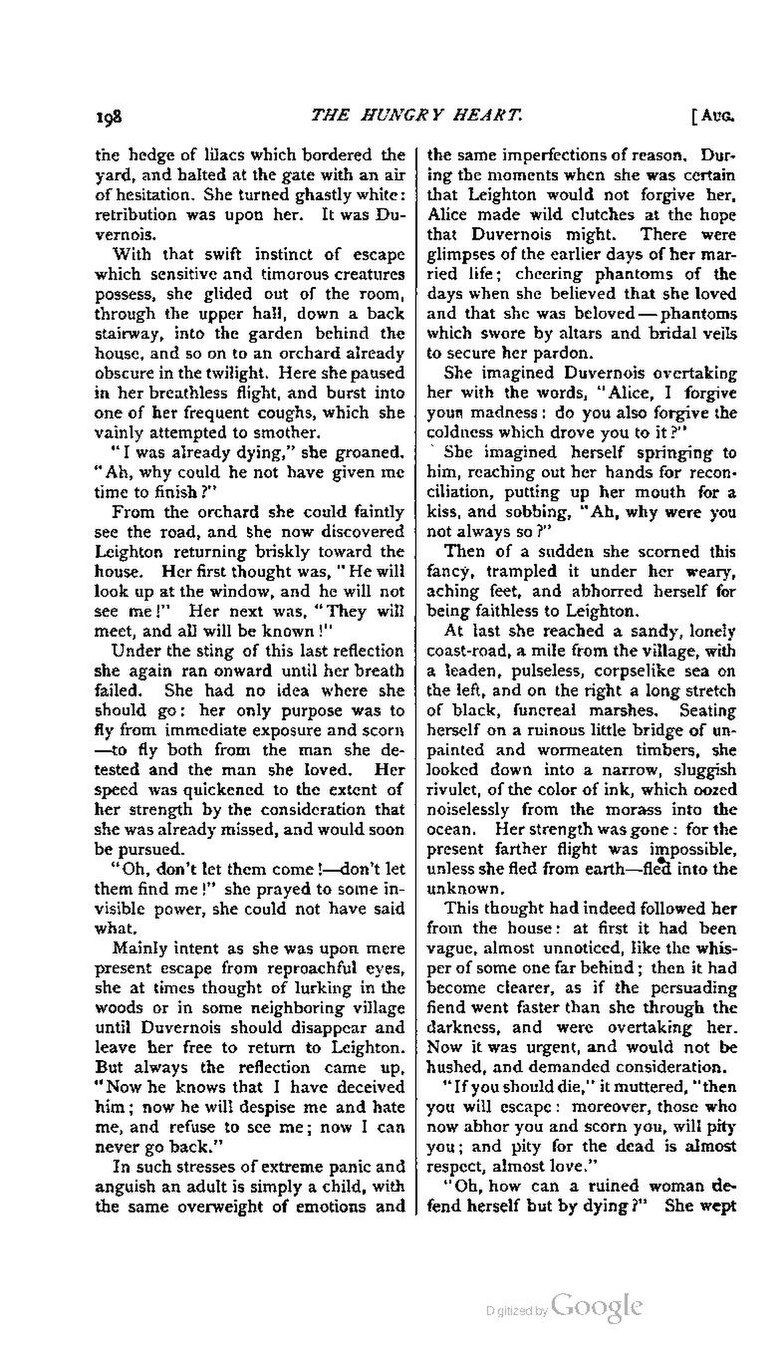the hedge of lilacs which bordered the yard, and halted at the gate with an air of hesitation. She turned ghastly white: retribution was upon her. It was Duvernois.
With that swift instinct of escape which sensitive and timorous creatures possess, she glided out of the room, through the upper hall, down a back stairway, into the garden behind the house, and so on to an orchard already obscure in the twilight. Here she paused in her breathless flight, and burst into one of her frequent coughs, which she vainly attempted to smother.
"I was already dying," she groaned. "Ah, why could he not have given me time to finish?"
From the orchard she could faintly see the road, and she now discovered Leighton returning briskly toward the house. Her first thought was, "He will look up at the window, and he will not see me!" Her next was, "They will meet, and all will be known!"
Under the sting of this last reflection she again ran onward until her breath failed. She had no idea where she should go: her only purpose was to fly from immediate exposure and scorn—to fly both from the man she detested and the man she loved. Her speed was quickened to the extent of her strength by the consideration that she was already missed, and would soon be pursued.
"Oh, don't let them come!—don't let them find me!" she prayed to some invisible power, she could not have said what.
Mainly intent as she was upon mere present escape from reproachful eyes, she at times thought of lurking in the woods or in some neighboring village until Duvernois should disappear and leave her free to return to Leighton. But always the reflection came up, "Now he knows that I have deceived him; now he will despise me and hate me, and refuse to see me; now I can never go back."
In such stresses of extreme panic and anguish an adult is simply a child, with the same overweight of emotions and the same imperfections of reason. During the moments when she was certain that Leighton would not forgive her, Alice made wild clutches at the hope that Duvernois might. There were glimpses of the earlier days of her married life; cheering phantoms of the days when she believed that she loved and that she was beloved—phantoms which swore by altars and bridal veils to secure her pardon.
She imagined Duvernois overtaking her with the words, "Alice, I forgive your madness: do you also forgive the coldness which drove you to it?"
She imagined herself springing to him, reaching out her hands for reconciliation, putting up her mouth for a kiss, and sobbing, "Ah, why were you not always so?"
Then of a sudden she scorned this fancy, trampled it under her weary, aching feet, and abhorred herself for being faithless to Leighton.
At last she reached a sandy, lonely coast-road, a mile from the village, with a leaden, pulseless, corpselike sea on the left, and on the right a long stretch of black, funereal marshes. Seating herself on a ruinous little bridge of unpainted and wormeaten timbers, she looked down into a narrow, sluggish rivulet, of the color of ink, which oozed noiselessly from the morass into the ocean. Her strength was gone: for the present farther flight was impossible, unless she fled from earth—fled into the unknown.
This thought had indeed followed her from the house: at first it had been vague, almost unnoticed, like the whisper of some one far behind; then it had become clearer, as if the persuading fiend went faster than she through the darkness, and were overtaking her. Now it was urgent, and would not be hushed, and demanded consideration.
"If you should die," it muttered, "then you will escape: moreover, those who now abhor you and scorn you, will pity you; and pity for the dead is almost respect, almost love."
"Oh, how can a ruined woman defend herself but by dying?" She wept
